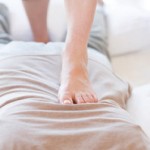 By Josephine Lynch
By Josephine Lynch
Member of the Shiatsu Society
Shiatsu means “finger pressure” in Japanese, where originally many blind people practised this treatment. It requires sensitivity and a heightened development of the ability to sense where a person is ”holding”, which usually interferes with the very natural flow of Vitality. The Shiatsu treatment, like much holistic treatment, is to restore and invigorate the person’s own ability to be well.
Recently there has been Research completed on Shiatsu, which was carried out by Professor Andrew Long from the University of Leeds. The study looked at the effects of Shiatsu as experienced and reported by practitioner and client. The data was gathered from Austria, Spain and the UK. A total of 633 clients completed all four questionnaires. The first one immediately after their treatment, the second between 4 and 6 days later, the third after 3 months and the fourth after 6 months.
The following were some of the reasons given for looking for a Shiatsu treatment: muscle and back pain, low energy and fatigue, emotional support, menstrual pain, to reduce use of medication. The study showed that Shiatsu helps clients feel calmer and more relaxed, and expressed feeling “physically more mobile, more able to cope with things, more energised.”
During the study, client’s symptoms were significantly reduced and these reductions were maintained throughout the 6 month long study. Both new and regular users of Shiatsu felt more aware of this and felt that Shiatsu had helped maintain their health and said they were more hopeful that their problems could be helped.
Interestingly, between 45% and 64% said they took more exercise and reported changes in their diet as a result of having Shiatsu and up to 32% had made changes in their working patterns.
Clients were also asked about any negative reactions and (if so) how long they lasted. Up to 22% reported some negative response and when further questioned some 88% of these reported “transitional” symptoms such as tiredness, headache, heightened emotions, which lasted no more that 2 days. The European Shiatsu Federation, which funded the study, strongly recommends that practitioners advise their clients of the potential of transitory adverse affects.
Many of the findings of the research strongly suggest that Shiatsu has a place in public health care. Shiatsu helps to reduce client’s symptoms as well as supporting and educating people to make healthier choices. Recently the World Health Organization said that diet and exercise has a far greater effect on the development of cancer than our genes. This is good news as it confirms what many of us believe, that we do have a certain positive impact over our well-being. Looking after ourselves, with Shiatsu perhaps, can be a means to do just that.
For more info and to read the executive summary of the report, visit www.shiatsu-esf.org

![istock_000003889525small-150×150[1]](https://www.positivelife.ie/dev/wp-content/uploads/2009/09/istock_000003889525small-150x1501.jpg)
